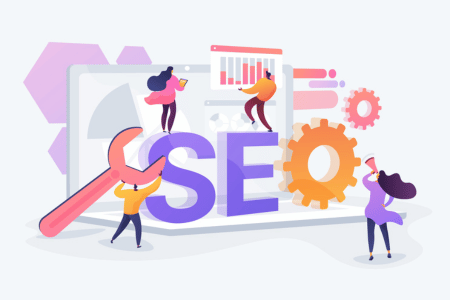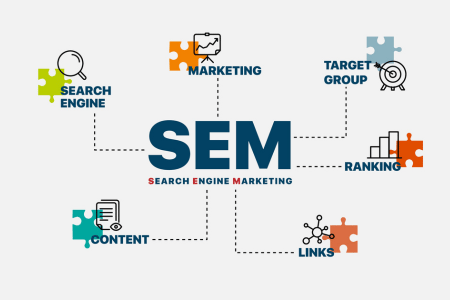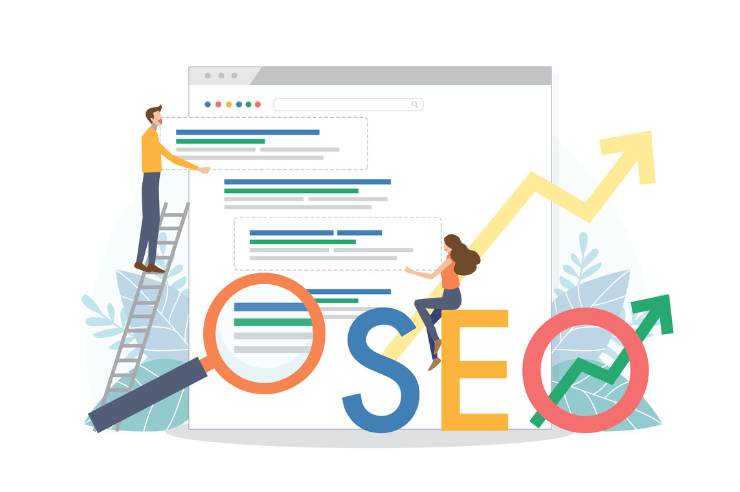Let’s get straight to the point: what is SEO? SEO is crucial for your online success. Why? Because a staggering 68% of online experiences begin with a search engine, and over half of all website traffic comes from organic search.
Now, let’s talk numbers. Data shows that SEO leads have an impressive 14.6% close rate. In comparison, the close rate for outbound leads such as direct mail or print advertising is a mere 1.7%, which is just one of the reasons why 60% of marketers say that inbound strategies, such as SEO, are their highest quality source of leads.
What Is SEO Marketing?
But what is SEO? It stands for Search Engine Optimization, which encompasses strategies to increase the quantity and quality of traffic to your website through organic search engine results. By optimizing your site for search engines, you’re making it easier for your target audience to find you when they search for keywords that are relevant to your business or industry.

SEO is not just about traffic; it’s about attracting the right traffic. And with SEO, the traffic is more sustainable, targeted, and costs significantly less in the long run compared to paid advertising.
So, what’s next? It’s time to get your hands dirty. Start by analyzing your website’s current SEO performance. Make necessary adjustments. Monitor the results. And most importantly, be patient and persistent. SEO is not a one-time task; it’s an ongoing commitment.
In a digital world where being on the second page of Google signifies obscurity, SEO acts as your torchbearer. Take the initiative to learn, implement, and continually improve your SEO strategies. Your website deserves to be in the spotlight; SEO is the pathway there.
How Does SEO Work?
SEO might seem like an intricate puzzle, but it’s truly a mechanism with set principles. Essentially, it involves two key players: search engines and the algorithms they employ.
Search engines like Google, Bing, and Yahoo aim to provide the most relevant and high-quality results for users’ queries. They utilize complex algorithms that take into account numerous factors, also known as ranking signals, to determine the relevancy and quality of a webpage. SEO revolves around optimizing your website to perform well based on these ranking signals.
Firstly, we have Crawling and Indexing. Think of search engines as diligent librarians. They send out crawlers (bots) to explore the vast digital library that is the internet. These bots inspect each webpage (book) they come across and record (index) useful information about them. It’s paramount to ensure your website is crawlable and its information easily indexable.
Next comes Relevance and Authority. Once your webpage is indexed, it enters the competition for visibility. Search engines analyze factors like the use of relevant keywords, the quality of content, and the number of quality backlinks pointing to your site. These act as endorsements of your content’s relevance to a user’s query and your website’s authority in your field.
Then, User Experience (UX) is a central factor. How easily can a visitor navigate your site? Is your site mobile-friendly? Does it load quickly? These are crucial questions because search engines favor sites that offer a good user experience. So, it’s vital to keep your website’s design user-friendly and its performance top-notch.
Finally, Local SEO factors are taken into account. If your business has a local presence, search engines will evaluate your local reputation. This involves consistent business information across platforms, positive customer reviews, and local keyword relevance.
In a nutshell, SEO works by harmonizing your website with the functioning of search engines. It’s like teaching your website to speak the language of search engines fluently. Remember, SEO isn’t about tricking the system but rather providing genuine value to internet users.
The Importance of SEO
By employing SEO, you are effectively investing in the robustness and visibility of your website. It is imperative to understand that SEO boosts your online presence and is a sustainable foundation for your brand. According to BrightEdge, 53.3% of all website traffic comes from organic search, highlighting the pivotal role SEO plays in driving traffic. SEO is a long-term investment, whereas paid advertising is a short-term expenditure.
It is crucial, however, not to view SEO as a set-and-forget strategy. Continuous effort and optimization are paramount.
The 4 Types of SEO Marketing
We will now explore the fundamental quartet that forms the bedrock of SEO marketing. These components are not mere adjuncts – they are paramount to online success.
1. On-Page SEO: Sprucing Up Your Website
Think of On-Page SEO as giving your website a makeover. It is about ensuring everything on your site is top-notch to get noticed by search engines. What’s important here? Using keywords – think of them as the hooks that grab attention.
Next, ensure your site’s titles are catchy, your headings stand out, and your content crystal clear and exciting. Keep things organized, make sure your web addresses (URLs) make sense, and set up helpful links between your pages, like setting up signposts that guide visitors through your site.
Imagine you own a blog about healthy eating. For On-Page SEO, you’d choose relevant keywords such as ‘healthy recipes,’ ‘low-carb meals,’ or ‘nutrition tips.’ You would then integrate these keywords into your content organically, such as in your blog titles, meta descriptions, and throughout the body of your blog posts.
You’d also make sure the URLs for your blog posts are clear and descriptive, like ‘www.yourwebsite.com/healthy-breakfast-ideas‘. And don’t forget internal linking – if you’re writing a post about vegan meals, link to your previous post about the benefits of a vegan diet.
2. Off-Page SEO: Making Friends in High Places
Off-Page SEO is like your website’s reputation. It’s all about what happens outside your website. Imagine your site is a store, and Off-Page SEO is what people are saying about it on the street. How do you get the street talking?
Build connections by getting other reputable places to link back to you. Engage on social media and make your presence felt, which builds your brand’s reputation and makes search engines trust you more.
Continuing with the healthy eating blog example, you might reach out to other relevant blogs or health and fitness websites and offer to write guest posts. In these posts, you’d include links back to your blog. This not only draws in potentially interested readers but also signals to search engines that your website has authority. You’d also be active on social media, sharing your posts and engaging with your followers, which further establishes your reputation and spreads the word about your blog.
3. Technical SEO: Fine-Tuning the Gears
Technical SEO is like taking your website to a mechanic for a tune-up. It ensures all the behind-the-scenes stuff works how it should so visitors don’t hit snags. We’re talking about making sure your site loads quickly, works well on mobile phones and doesn’t have any roadblocks that would keep search engines from being able to take a good look around. It’s like making sure your shop is easy to enter, and the sign is visible from the street.
Now, consider the technical side. You want your blog to load fast, so you optimize your images and streamline your code. You’d make sure your blog looks great and is easy to navigate on mobile devices, given that over half of global web traffic comes from mobile. You’d also create a clear and intuitive site structure, so both your visitors and search engine crawlers can easily navigate and understand your content.
4. Local SEO: Becoming a Local Hero
Local SEO is for those with a local business who want people nearby to find, ensuring that your shop comes up as a top choice when someone in your town searches for a service you offer. How do you do this? Focus on local keywords, create content your local community finds relevant, and use platforms like Google My Business to get noticed. Ensure your business’s name, address, and phone number are consistent across all platforms. Search engines love consistency; it makes you look more trustworthy and authentic.
If you were a local health food store owner in addition to running your healthy eating blog, you’d want to ensure local customers can find you. This involves using local keywords like ‘health food store in [Your City]’ and creating content relevant to your local community, like a post about sourcing local organic produce. You’d make sure your store is listed and verified on Google My Business, with consistent information like your business name, address, and phone number across all online platforms. Positive reviews on local business directories would be the cherry on top.
In a Nutshell, On-Page SEO tidies up your site, Off-Page SEO builds its reputation, Technical SEO ensures everything runs smoothly, and Local SEO gets you noticed in your neighborhood. These are the four pillars that hold your online presence high. Don’t ignore them; embrace them!
Understanding the Difference Between SEM and PPC
Let’s delve into the finer details of SEM and PPC, two essential components of a potent online marketing strategy.
SEM (Search Engine Marketing)

What is it?
SEM is the umbrella term for strategies used to gain visibility on search engine results pages (SERPs). It combines both paid and organic tactics.
Why is it Important? In this era of digital dominance, consumers turn to search engines for answers. SEM puts your business in front of an audience actively searching for products or services like yours.
Key Elements:
- SEO (Search Engine Optimization): Optimizing your site to rank higher in organic search results.
- PPC (Pay-Per-Click): Paying for ad space in search results.
Strategic Actions: Utilize keyword research to understand what your audience is searching for and optimize your content accordingly. For paid strategies, set a budget and target audience for your ads.
PPC (Pay-Per-Click)
What is it?
A subset of SEM where you pay a fee each time someone clicks on your advertisement.
Why is it Important? It’s a way to buy site visits rather than earn them organically. It’s like taking an express elevator to the top of the SERPs.
Key Elements:
- Keyword Targeting: Select keywords to trigger your ads.
- Ad Creation: Crafting compelling ads that entice clicks.
- Landing Page Optimization: Ensuring the page users land on is relevant and encourages action.
Strategic Actions: Constantly monitor and analyze the performance of your ads. Utilize A/B testing to optimize ad copy and landing pages. Adjust bids for keywords based on performance.
SEO Best Practices
Let’s break down the cornerstones of an outstanding SEO strategy, ensuring that your content shines and your audience is engaged.
Quality Content: The centerpiece of your SEO strategy. Like the main course in a fine dining experience, your content needs to be delectable and offer genuine value to your audience. How can you achieve this? The trick lies in focusing on solving problems and answering questions that your audience might have. Utilize visuals and real-life examples to add depth and tangibility to your content. This way, not only does your content become a source of valuable insights but also an engaging read.
User Experience: Imagine stepping into a well-organized store where everything is at your fingertips – that’s exactly how a visitor should feel navigating your website. A user-friendly website keeps visitors engaged, encouraging them to explore more and ultimately convert. To ace this, ensure your website loads swiftly and displays perfectly across all devices, from desktops to mobile phones. An intuitive layout that guides users seamlessly through your content can work wonders too.
Local SEO: Building a local community around your brand is important to becoming the neighborhood’s favorite store. Local SEO is all about ensuring your local audience finds you when they need your products or services. The key here is to optimize your content for local keywords, actively engage with your local community on social media, and keep your NAP (Name, Address, Phone number) information consistent across all platforms.
Data Analysis: Using data in your SEO strategy is akin to employing a compass and a map on an expedition. They help steer you in the right direction, ensuring your efforts are focused and fruitful. Tools like Google Analytics can offer invaluable insights into what content is performing the best and where most of your traffic is originating from. Regular data analysis and strategies like A/B testing can help fine-tune your SEO efforts for maximum results.
Backlinks: Backlinks are like gold stars given by the internet to your website. Each link from another reputable website to yours is like a vote of confidence in your content. Crafting excellent, link-worthy content and participating in guest posting on credible sites can significantly enhance your website’s backlink profile.
Mobile Optimization: With a significant chunk of internet users browsing on their mobile devices, it’s imperative that your website looks good and functions flawlessly on smaller screens. Responsive design should be your go-to strategy, ensuring that your content is as accessible on a mobile phone as it is on a larger desktop. Pay special attention to interactive elements such as buttons and links – they should be easily clickable, providing a smooth experience to touch-screen users.
Adhering to these best practices and continuously optimizing your strategy set the stage for significant online success. The digital landscape is constantly evolving- be vigilant and adaptable. Engage with your audience, and build a website and experience. Your efforts in SEO and SEM today can reap bountiful rewards in the form of increased visibility, traffic, and conversions. It’s not merely about being online; it’s about being found and leaving an indelible mark. Your digital legacy. Shape it with wisdom, diligence, and excellence.
Evolving Trends in SEO
In the rapidly changing world of SEO, keeping pace with emerging technologies and shifting user preferences is critical. It’s about strategically evolving SEO tactics to meet the dynamic demands of the digital landscape.
Voice Search: The advent of voice assistants has ushered in the era of voice search. Optimize for conversational queries and long-tail keywords to ensure your content is voice-search-friendly.
Mobile Optimization: With the ubiquity of smartphones, mobile optimization is no longer optional; it’s compulsory. A mobile-responsive design, fast loading times, and user-friendly navigation are essential for a robust mobile presence.
Featured Snippets and Schema Markup: Gaining a position in the coveted “Position Zero” through featured snippets and utilizing schema markup can significantly boost your visibility on SERPs. Think of it as a fast pass in search results to the front of the line.
AI and Machine Learning in SEO: As artificial intelligence and machine learning technologies become more sophisticated, they’re beginning to play a more significant role in SEO. Google’s AI algorithm, RankBrain, and the newer BERT model focus on interpreting the nuances of language and delivering more accurate results..
Video SEO: Video content continues to grow in popularity, and with platforms like YouTube playing a pivotal role in people’s online experiences, optimizing video content for search is becoming increasingly important.
Algorithm Updates: Google’s algorithm updates can be game-changers. Stay vigilant, monitor your traffic and rankings, and be prepared to adapt your strategies in response to these updates.
Common SEO Mistakes
The intricate world of SEO presents a multitude of potential pitfalls. Steering clear of these common mistakes is vital to your SEO initiatives’ enduring success and integrity.
Keyword Stuffing: This outdated tactic of overloading content with keywords is ineffective and can incur penalties. Focus on creating natural, valuable content that satisfies user intent.
Black Hat Techniques: Engaging in dubious or unethical SEO practices, akin to the dark arts, is detrimental to your site’s standing and reputation. Think of black hat techniques as the nemesis that must be vanquished.
Ignoring Meta Descriptions and Title Tags: These are crucial elements that contribute significantly to your site’s visibility on SERPs. Neglecting to optimize them or leaving them blank is a missed opportunity to entice users and search engines alike.
Not Investing in a Fast and User-friendly Site: Website speed and user experience are integral to SEO. Slow loading times and poor navigability can result in high bounce rates, negatively impacting your site’s ranking.
Overlooking Local SEO: If your business has a local component, ignoring local SEO can be a major oversight. Ensuring your business appears in local search results and on Google Maps can drive significant traffic.
Inconsistent or Infrequent Content Updates: Search engines and users alike favor fresh and up-to-date content. Sporadic content updates or leaving outdated content on your site can hinder your SEO performance.
Not Conducting Regular SEO Audits: Failing to regularly audit your website for SEO can lead to outdated strategies, broken links, or unnoticed shifts in website traffic. Regular SEO audits help align your SEO strategy with your goals and current best practices.
Ethical SEO Practices: Embrace the tenets of white hat SEO as your guiding light. Commit to transparency, adhere to search engine guidelines, and engage in practices that offer genuine value to users.
Start Improving Your Website SEO
We have now answered the question, “What is SEO,” so you should feel confident in SEO’s value. Remember, SEO is more than just a marketing strategy—it’s the fundamental driver of your online visibility. Utilize the power of SEO, and watch as your website evolves into a hub of opportunities. The time to act is now.
Ready to start dominating search results? Choose Oyova SEO services. Our team of SEO experts will guide you through the maze of optimization, ensuring your website shines brightly on search engines. Contact us today, and set your course to SEO success.
